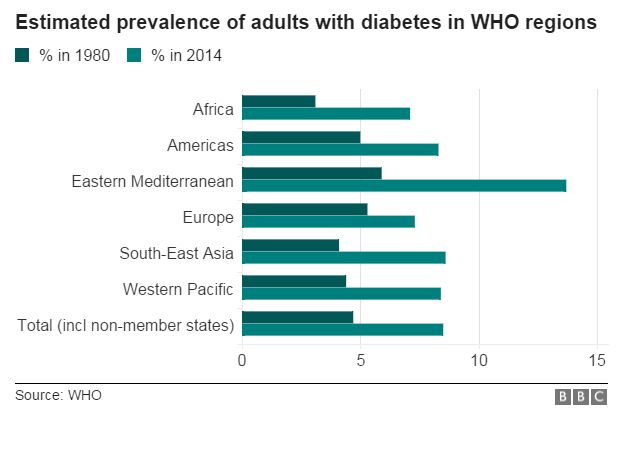The world is facing an "unrelenting march" of diabetes which now affects nearly one in 11 adults, the World Health Organization (WHO) says.
In a major report it warned cases had nearly quadrupled to 422 million in 2014 from 108 million in 1980.
High blood sugar levels are a major killer - linked to 3.7 million deaths around the world each year, it says.
And officials said the numbers would continue to increase unless "drastic action" was taken.
The report lumps both type 1 and type 2 diabetes together, but the surge in cases is predominantly down to type 2 - the form closely linked to poor lifestyle.
As the world's waistlines have ballooned - with one-in-three people now overweight, so too has the number of diabetes cases.

Dr Etienne Krug, the WHO official in charge of leading efforts against diabetes, told the BBC: "Diabetes is a silent disease, but it is on an unrelenting march that we need to stop.
"We can stop it, we know what needs to be done, but we cannot let it evolve like it does because it has a huge impact on people's health, on families and on society."
Failing to control levels of sugar in the blood has devastating health consequences.
It triples the risk of a heart attack and leaves people 20 times more likely to have a leg amputated, as well as increasing the risk of stroke, kidney failure, blindness and complications in pregnancy.

Diabetes itself is the eighth biggest killer in the world, accounting for 1.5 million deaths each year.
But a further 2.2 million deaths are linked to high blood sugar levels. And 43% of the deaths were before the age of 70.
Moving burden
In the 1980s the highest rates were found in affluent countries.
But, in a remarkable transformation, it is now low and middle income countries bearing the largest burden.
Dr Krug told the BBC News website: "That's where we see the steepest increase. Knowing that's where most of the population lives in the world, it does show numbers will continue to increase unless drastic action is taken."

The Middle East has seen the prevalence of diabetes soar from 5.9% of adults in 1980 to 13.7% in 2014.
Dr Slim Slama, a WHO specialist in region, told the BBC News website: "We are the region that has experienced the greatest rise in diabetes, moving from 6 million to 43 million - it is a huge, huge increase.
"In Qatar or Kuwait we have more than 20% of the population with diabetes and when you look at subgroups - people beyond 45 or 60 years old - it's 30-40% and things are even more worrying."
He said growing and ageing populations were behind part of the rise, but diet and inactivity were a major problem.
More than three quarters of teenagers in the region are doing less than the recommended level of exercise, he said.
Latest Stories
-
Built by brains
6 minutes -
Lali x Lola to cut off their hair in advocacy for peace between Stonebwoy and Shatta Wale
9 minutes -
Ghana hosts maiden Africa Sustainability Insurance Conference
16 minutes -
Meta expands restrictions for teen users to Facebook and Messenger
20 minutes -
“Add life to days”: Prof. Ameyaw champions comprehensive palliative care in Ghana
23 minutes -
Cooperate with us – NACOC tells Ntim Fordjour over ‘suspicious flight’ claims
30 minutes -
Hilla Limann Technical University TUTAG declares indefinite strike
40 minutes -
No contract approvals without commencement authorisation – Finance Minister
45 minutes -
Clean energy’s share of world’s electricity reaches 40%, report says
48 minutes -
China is not backing down from Trump’s tariff war. What next?
49 minutes -
Ben South makes stand-up comedy debut at ‘A Fool in April’
1 hour -
U.S and Ghana armies co-host weeklong Land Forces Summit in Accra
1 hour -
Big Chef Season 4 auditions: 30 talented young cooks battle for spot in Top 12
1 hour -
CAMON 40 gets you to the UK to see Kudus live courtesy of TECNO Ghana
1 hour -
Zelensky confirms Ukraine troops in Russia’s Belgorod region
1 hour

